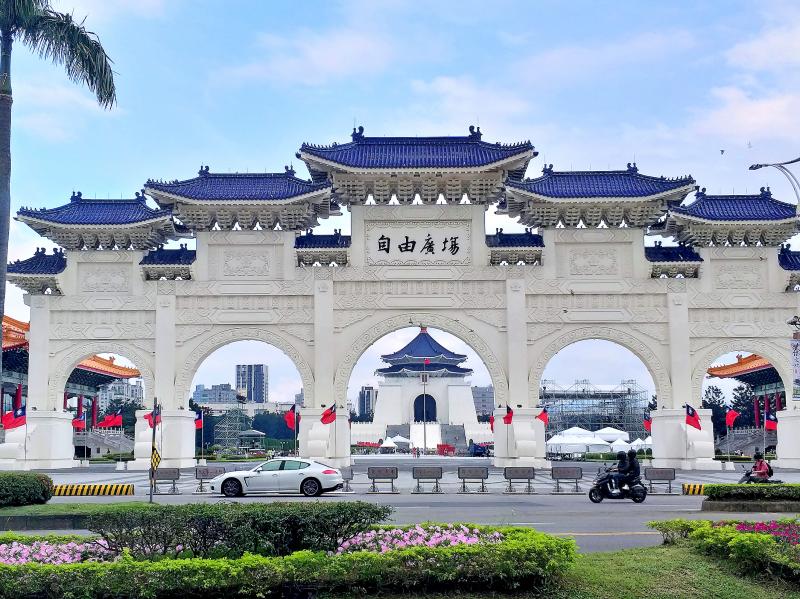The way a nation utilizes the heart of its capital reflects its values, the Transitional Justice Commission said in its proposal for transforming Taipei’s Chiang Kai-shek Memorial Hall, asking what message it sends if the person responsible for persecuting thousands is still commemorated just like he had been under authoritarian rule.
The commission on Wednesday last week announced initial plans for erasing traces of authoritarianism from the memorial hall, starting with its “axis of worship,” or the 6.3m-tall bronze statue of Chiang Kai-shek (蔣介石) in the main building.
There are at least two main reasons for transforming the complex, the commission said.

Photo: Chen Yu-hsun, Taipei Times
The first is a matter of principle, as democracies should not commemorate authoritarian rulers on the same scale and in the same way that they were honored in the past, it said.
The second reason is more practical, as the way in which a nation utilizes the center of its capital reflects its values at different moments in time, it said.
“The nation should not be spending so many resources to commemorate an authoritarian ruler,” the commission said, adding that original plans for the space did not even include a memorial hall.
From the 1880s, the 75,000 ping (247,934m2) area was used as military grounds, it said.
In 1971, the Executive Yuan proposed building a commercial center to showcase the nation’s modernization and economic development, the commission said.
It was only after Chiang’s death four years later that the government decided to build the memorial instead, utilizing traditional Chinese architectural elements in a reflection of party ideology, it said.
The commission also questioned maintaining the memorial.
Under the party-state system created by Chiang, all political and military power was controlled by one individual, the commission said.
Of the 7,822 people implicated for political crimes during his rule, Chiang exercised his right to personally review 3,469 cases, it said, adding that more than 60 percent were handed heavy sentences and 27.69 percent were sentenced to death.
Even though he did not rule on every case himself, past research has shown that he still heavily influenced judgements, as he had the final say in any political cases, causing lower-ranking officials to try and pre-empt his desires.
Considering the pain he caused, what message is being conveyed to the next generation by using public funds to maintain a memorial to Chiang, even long after democratization, the commission asked.
The memorial should be given back to the people and reinterpreted to inspire education about the nation’s past, it added.

US climber Alex Honnold is to attempt to scale Taipei 101 without a rope and harness in a live Netflix special on Jan. 24, the streaming platform announced on Wednesday. Accounting for the time difference, the two-hour broadcast of Honnold’s climb, called Skyscraper Live, is to air on Jan. 23 in the US, Netflix said in a statement. Honnold, 40, was the first person ever to free solo climb the 900m El Capitan rock formation in Yosemite National Park — a feat that was recorded and later made into the 2018 documentary film Free Solo. Netflix previewed Skyscraper Live in October, after videos

Starting on Jan. 1, YouBike riders must have insurance to use the service, and a six-month trial of NT$5 coupons under certain conditions would be implemented to balance bike shortages, a joint statement from transportation departments across Taipei, New Taipei City and Taoyuan announced yesterday. The rental bike system operator said that coupons would be offered to riders to rent bikes from full stations, for riders who take out an electric-assisted bike from a full station, and for riders who return a bike to an empty station. All riders with YouBike accounts are automatically eligible for the program, and each membership account

A classified Pentagon-produced, multiyear assessment — the Overmatch brief — highlighted unreported Chinese capabilities to destroy US military assets and identified US supply chain choke points, painting a disturbing picture of waning US military might, a New York Times editorial published on Monday said. US Secretary of Defense Pete Hegseth’s comments in November last year that “we lose every time” in Pentagon-conducted war games pitting the US against China further highlighted the uncertainty about the US’ capability to intervene in the event of a Chinese invasion of Taiwan. “It shows the Pentagon’s overreliance on expensive, vulnerable weapons as adversaries field cheap, technologically

NUMBERs IMBALANCE: More than 4 million Taiwanese have visited China this year, while only about half a million Chinese have visited here Beijing has yet to respond to Taiwan’s requests for negotiation over matters related to the recovery of cross-strait tourism, the Tourism Administration said yesterday. Taiwan’s tourism authority issued the statement after Chinese-language daily the China Times reported yesterday that the government’s policy of banning group tours to China does not stop Taiwanese from visiting the country. As of October, more than 4.2 million had traveled to China this year, exceeding last year. Beijing estimated the number of Taiwanese tourists in China could reach 4.5 million this year. By contrast, only 500,000 Chinese tourists are expected in Taiwan, the report said. The report